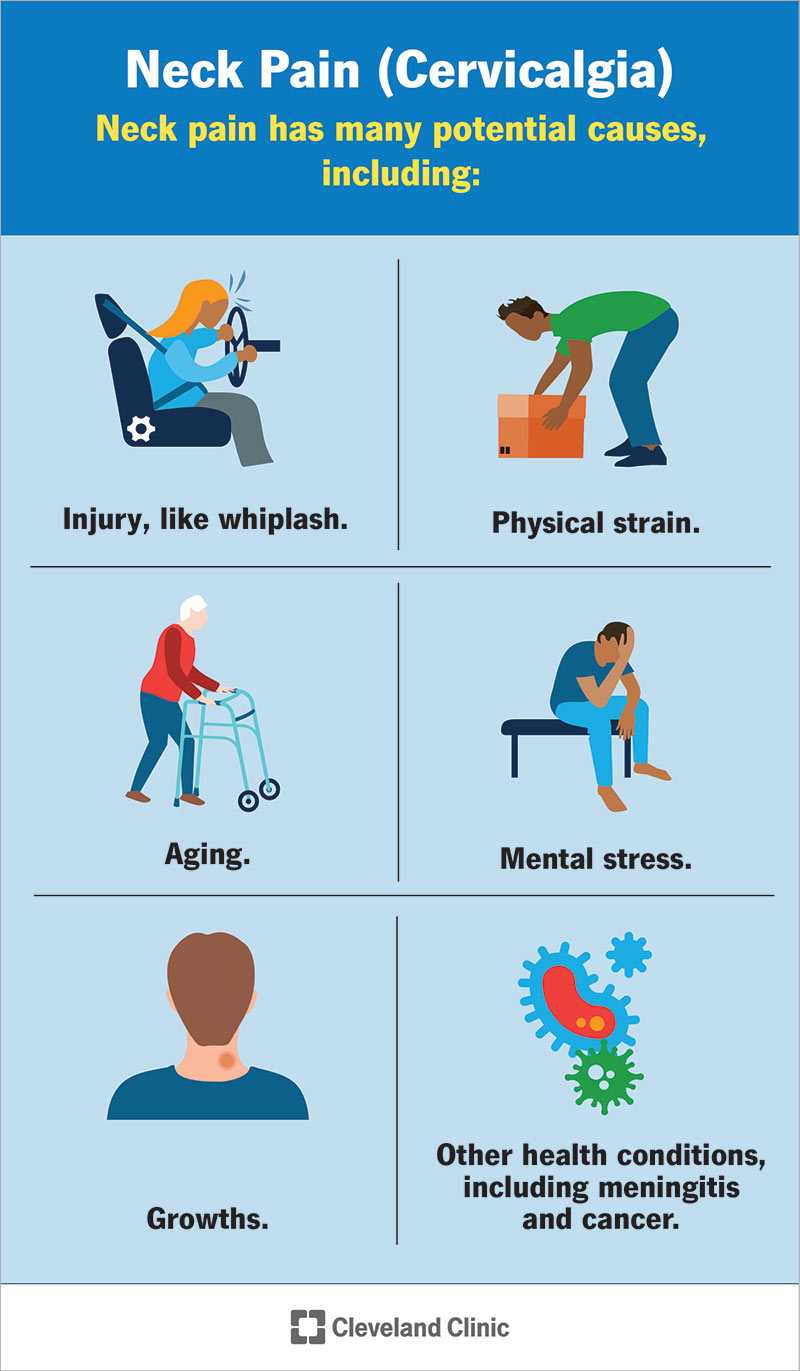Neck pain, or cervicalgia, can last from days to years, depending on the cause. Common causes include physical strain, poor posture, mental stress, osteoarthritis, spinal stenosis, herniated disk, pinched nerve, tumors and other health conditions.
Advertisement
Cleveland Clinic is a non-profit academic medical center. Advertising on our site helps support our mission. We do not endorse non-Cleveland Clinic products or services. Policy
Video content: This video is available to watch online.
View video online (https://cdnapisec.kaltura.com/p/2207941/sp/220794100/playManifest/entryId/1_b8d3ez8z/flavorId/1_5f3sgelj/format/url/protocol/https/a.mp4)
Dr. Andrew Bang answers common questions about neck pain.
Neck pain, sometimes called cervicalgia, is pain in or around your spine beneath your head. Your neck is also known as your cervical spine. Neck pain is a common symptom of many different injuries and medical conditions.
Advertisement
Cleveland Clinic is a non-profit academic medical center. Advertising on our site helps support our mission. We do not endorse non-Cleveland Clinic products or services. Policy
You might have axial neck pain (felt mostly in your neck) or radicular neck pain (pain that shoots into other areas, such as your shoulders or arms). It can be acute (lasting from days to six weeks) or chronic (lasting longer than three months).
Neck pain can interfere with your daily activities and reduce your quality of life if it’s not treated.
Fortunately, most causes of neck pain aren’t serious and improve with conservative treatments, like pain medicine, exercise and stress management.
Some people describe the pain as:
Neck pain may involve other symptoms, including:
Neck pain is common, affecting 10% to 20% of adults. It’s more common in women. Your chance of developing it increases with age.

Image content: This image is available to view online.
View image online (https://my.clevelandclinic.org/-/scassets/Images/org/health/articles/21179-neck-pain-cervicalgia)
Neck pain has many potential causes, including:
Advertisement
Usually, a medical history and a physical exam are enough for a healthcare provider to diagnose the cause of neck pain. A healthcare provider will first eliminate serious causes of neck pain, like pressure on your spinal cord, myelopathy, an infection or cancer.
In rare instances, your provider may order additional tests, including:
Treatment aims to relieve your pain and improve movement in your neck. Most causes of neck pain eventually improve and can be managed at home. Your provider will suggest treatments to manage your symptoms, including:
Advertisement
If your pain is severe, you may need to work with a spine or pain specialist.
In addition to taking pain relief medications, you can take steps at home to relieve neck pain, including:
Healing time depends on what’s causing your neck pain. Neck pain caused by common issues like strains and stress usually improves within a week or two. It may take a few months before the pain disappears entirely.
Advertisement
You can take steps to prevent neck pain related to strains and tense muscles.
Advertisement
Exercises that can help strengthen your upper back extensor muscles include:
Contact a healthcare provider if you have neck pain that interferes with work or other daily activities. In rare cases, neck pain can be a sign of a medical emergency.
Seek urgent medical care if your neck pain:
It’s easy to overlook the important work your neck does — until you experience neck pain or have trouble moving your head. The average human head weighs about 10 pounds. Your neck is responsible for supporting this weight and keeping your head aligned with the rest of your body. Over time, this work can take a toll on your body, especially if you’re constantly straining your neck. Take preventive steps to avoid neck pain, like practicing good posture and taking frequent breaks to move and stretch. If you’re experiencing neck pain, see a healthcare provider. They can recommend medications and therapies that can provide relief.

Sign up for our Health Essentials emails for expert guidance on nutrition, fitness, sleep, skin care and more.
Learn more about the Health Library and our editorial process.
Cleveland Clinic’s health articles are based on evidence-backed information and review by medical professionals to ensure accuracy, reliability and up-to-date clinical standards.
Cleveland Clinic’s health articles are based on evidence-backed information and review by medical professionals to ensure accuracy, reliability and up-to-date clinical standards.
Everyday things like turning your head shouldn’t be a pain in the neck. Cleveland Clinic medical spine experts can find ways to ease your cervical neck pain.
